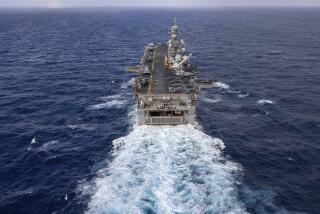Kuwaiti Plan to Expand Reflagging Told
- Share via
WASHINGTON — The Kuwaiti government is seeking to expand the scope of U.S. military protection for its oil tankers in the Persian Gulf far beyond the escort mission formally outlined by the Administration, according to the leader of a congressional delegation that returned from the region Tuesday.
Rep. Les Aspin (D-Wis.), chairman of the House Armed Services Committee, said late Tuesday that the Kuwaitis want to implement a plan that could double the amount of oil that would be protected under the escort formula announced by the Administration, to 70% from the 35% projected by U.S. officials.
The escorting of this additional oil could also double the U.S. military presence in the area originally foreseen by the Administration. Although Kuwaiti officials did not specify the number of tankers that would be required under their revised plan, Aspin said the officials told him that they plan to charter two additional American-flag oil tankers “within days.” That would raise the number under U.S. protection to 13.
Original Plan
The U.S. plan, as originally presented by the Administration, was for the Navy ships and planes to protect 11 Kuwaiti oil tankers, “reflagged” as American vessels, through the gulf in an effort to underscore U.S. determination to keep open international shipping lanes. Such shipping has become increasingly risky because of the Iran-Iraq War, in which Kuwait has sided with Iraq.
Aspin said he is not certain whether the Kuwaitis consulted with American officials before devising the new shipping plan. However, he said, the apparent discrepancy between the Kuwaiti and U.S. formulas for the gulf operation will almost certainly delay the U.S. escort plan, which is scheduled to start as early as next week.
“I don’t know whether they’ve upped the ante or whether this was something that was discussed before,” Aspin said. “The Kuwaitis have played the Administration like a fiddle on this.”
The Pentagon had no immediate comment on Aspin’s report. A Pentagon spokesman said earlier in the day that Navy ships and planes were conducting “normal preparations” for the mission, which he said is still set to begin the middle of July.
At the White House, presidential spokesman Marlin Fitzwater said in reaction to Aspin’s comments: “I’m not aware of any (delay), but I haven’t heard of this new concern. I’m not aware of any change in the status of our reflagging or our operation.”
State Department spokesman Charles Redman said there is no disagreement between the Kuwaitis and the United States.
Under its original plan, the Administration envisioned about five round-trip escorts a month and has increased U.S. Middle East naval forces from six ships to nine to handle the escort duty. The Air Force also has stepped up its AWACS aerial radar surveillance of the gulf region.
Shuttle System
Aspin said Tuesday, however, that the Kuwaitis are planning to institute a “shuttle” arrangement that would increase the number of trips through the gulf for the American-flag ships and the amount of time that they would be under U.S. military escort.
Under the Kuwaiti plan, the tankers would traverse the gulf until safely escorted through the Strait of Hormuz, which is within the range of anti-ship Silkworm missiles on the coast of Iran and is considered one of the most dangerous parts of the region. The tankers would then transfer the oil to smaller, commercial vessels at the port of Khor Fakkan in the United Arab Emirates.
U.S. escort duty could more than double under this plan, which was presented July 4 to the 12-member congressional group by the Kuwaiti oil minister and would require a “much larger” U.S. naval presence in the region, Aspin said.
More to Read
Sign up for Essential California
The most important California stories and recommendations in your inbox every morning.
You may occasionally receive promotional content from the Los Angeles Times.












